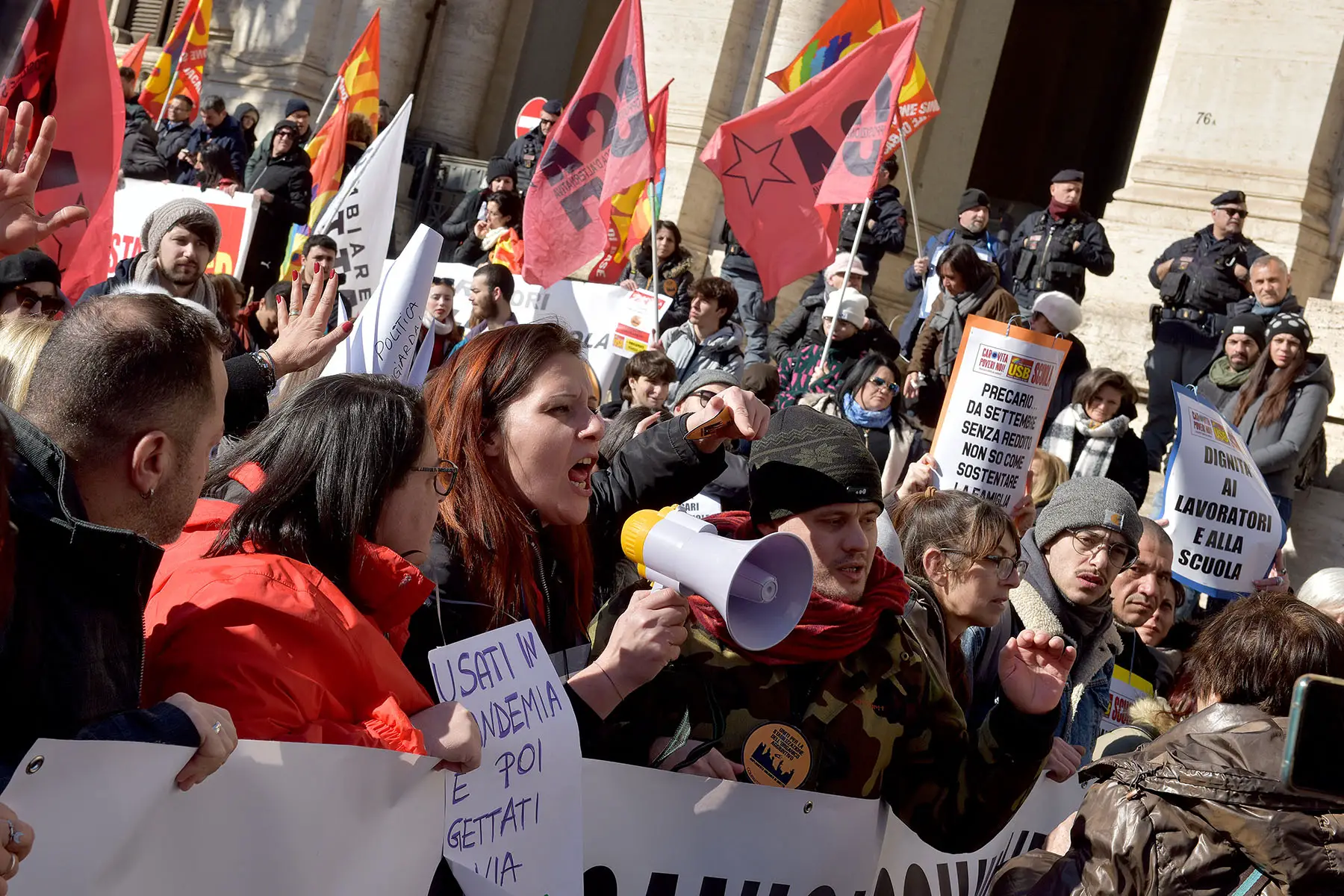Italy is an incredible country, famous for its cuisine, museums, festivals, and city life. But what you have yet to hear expats say is that they moved there for the employment laws.
You should, though, because Italian labor standards are subjectively great. For example, you can almost always get an open-ended contract, and trade unions will fight for your rights.
Discover what else there is to know about Italian labor laws, including:
- Labor law in Italy
- Foreign workers – your right to work in Italy
- Employment contracts in Italy
- Wages and salary in Italy
- Work hours in Italy
- Paid and unpaid leave
- Parental rights in Italy
- Social security and taxes in Italy
- Protection from discrimination at work
- Joining a union in Italy
- Health and safety at work in Italy
- Training and development in Italy
- Terminating the employment relationship
- Company mergers and insolvencies in Italy
- Temporary, part-time, agency, and informal workers
- Making a complaint as a worker in Italy
- Useful resources
Moving2Italy
When relocating to Italy, get expert help from Moving2Italy on taxes, work permits, and setting up a business. They also provide personalized support for immigration, social security, and residence, helping you navigate your new life abroad. For assistance with fiscal and immigration matters, contact Moving2Italy.
Labor law in Italy
Italy scores well when it comes to employees’ rights. In fact, it is among the top best countries on the 2023 Global Rights Index measuring worker and trade union rights. Union membership is fairly high and employees have their civil liberties protected in employment contracts.
The country also scores an incredible 94/100 on the 2022 Labor Rights Index. This rate is higher than the regional average of 89 observed across Western Europe.

The Italian Constitution (Costituzione Italiana) covers a number of basic employment rights, including the right to work for fair pay, join a union, receive social security, and have access to equal opportunities. Other sources of labor law include:
- The Civil Code (Codice Civile) covers employment relationship
- A vast number of collective agreements negotiated between the Italian authorities and trade unions that cover issues like wages and holiday entitlements
- The Workers’ Statute (Statuto dei Lavoratori) covers the protection of the freedom and dignity of workers, trade unions and union activity in the workplace, and rules on employment
Italy also occasionally introduces government reforms to labor laws. The most recent was the adoption of EU Directive 2019/1158, which supports workers with caring responsibilities (e.g., parents and guardians) and encourages a more equal sharing of caring responsibilities between women and men.
The Ministry of Labor and Social Policies (Ministero del Lavoro e delle Politiche Sociali) creates Italy’s policies of labor, employment, labor protection, and social security.
The National Agency for Active Labor Policies (Agenzia Nazionale per le Politiche Attive del Lavoro – ANPAL) provides information about the labor market. It also promotes people’s right to work, training, and professional growth, and coordinates the national network of employment services.
Foreign workers – your right to work in Italy
Similar to other countries in the European Union (EU) and the European Free Trade Association (EFTA – Iceland, Liechtenstein, Norway, and Switzerland), Italy has a two-tier immigration system that applies to the right to work. This means that EU/EFTA citizens can work in Italy without restriction and only need a passport or valid ID to enter the country for job purposes.
Nationals from outside those regions (i.e., third-country citizens) usually need a work visa before they come to Italy and find employment. Although this sounds straightforward, it typically means securing a job first, which can be difficult as the country has annual quotas (decreto flussi) for non-EU/EFTA workers.
That said, residents from certain countries – including Australia, Canada, Japan, South Korea, Ukraine, and the US – can do short-term work (up to three months) without a visa or permit. They must leave the country once this period is up.
Employment contracts in Italy
Under Italy’s labor law, every person who works has a right to an employment contract (contratto di lavoro). These don’t necessarily have to be extensive contracts in writing but can be, for example, oral agreements. However, key information (such as salary and work hours) must be in a written document within 30 days of the start date.

In general, employment contracts are in Italian, and there is no legal obligation to translate them into any other language. However, employers can choose to provide foreign employees with a translation so that they fully understand the terms.
A standard Italian employment contract should include:
- Employer and employee details
- Job title and level
- Starting date
- Details of employee duties, which should match the advertised job description
- Job salary, plus information on bonus payments and additional benefits
- Standard work hours and overtime arrangements
- Details of holiday entitlements, sick pay, and parental leave
- Notice period on both sides
- Information on any trial or probation period, which cannot exceed six months (during which time the notice period doesn’t apply)
- Contract end date (for fixed-term agreements)
- Important general terms and conditions
Once both parties have signed it, the employer must register full contracts with the local employment center (centro per l’impiego).
Following the 2015 Jobs Act, employers can make certain amendments to signed contracts. For example, they can change duties or job levels as long as there is no salary reduction. However, they need to inform employees, and ideally consult with them beforehand.
Open-ended contracts
Also called the indefinite or permanent contract, the open-ended contract (contratto a tempo indeterminato) is the standard form of job agreement in Italy. These can be for full-time or part-time work and have no fixed end date. Instead, either party will have to give the appropriate notice period if they want to terminate the contract.
Employers have to provide a good reason for terminating this type of contract. Either side can end the contract without the notice period if there is ‘just cause’. For example, if the employee commits a serious offense or the employer seriously flouts health and safety regulations, the notice period is waived.
Fixed-term contracts
A fixed-term contract (contratto a tempo determinato) has a fixed end date and is often used for temporary work. This includes seasonal work and replacement work to cover someone on parental leave.

According to labor laws, employers can only use fixed-term contracts if they have a good reason. Furthermore, the total number of fixed-term contracts cannot exceed 20% of the total number of open-ended contracts within any organization.
Fixed-term employment contracts can only be used for positions lasting up to 12 months, extending to a maximum of 24 months. Under certain circumstances (i.e., specified collective agreements or seasonal activities), they can extend up to four months beyond that but not any longer than that.
If an employee continues to work beyond the duration of a fixed-term contract, they are entitled to an open-ended contract after 20 days as well as compensation for working without a contract.
Following the end of a fixed-term agreement, employers cannot rehire that person for 20 days.
Fixed-term agreements can only be terminated early if there is a good reason, for example, if the employee is not performing their duties to an acceptable standard.
Other types of employment contract in Italy
- Part-time contract (contratto part-time) – for jobs under 30 hours per week. Holiday entitlements will be reduced in line with work hours. The contract should contain details of the work schedule along with information on how flexible this is.
- Internship contract (contratto di tirocinio) – for internships. These usually consist of fewer worker entitlements, for example interns are not entitled to agreed minimum salaries.
- Apprenticeship contract (contratto di apprendistato) – for trainees aged 15–29. The contract should include details of the training program.
- On-call contract (contratto di lavoro a chiamata) – for jobs where the employee is only needed for set periods (e.g., nurses). These contracts cannot exceed 400 working days within three years.
- Temporary agency contracts – for employees working at an organization while technically being employed by a third-party agency. Employees recruited through an agency are entitled to the same rights as standard employees.
- Self-employed/freelancer contracts – these are slightly different and are used when work is contracted out or commissioned to freelance workers. They tend to be simple agreements detailing the nature of fixed pieces of work and don’t involve things such as notice periods or holiday pay.
Wages and salary in Italy
Italy is one of six EU countries that doesn’t have a legal minimum wage. The majority of workers in the country have their wages protected by collective bargaining agreements between employers and workers’ unions that apply to specific sectors. These agreements will specify a minimum income.

Salaries vary greatly across sectors, job levels, and regions. In 2021, the overall average in Italy was $40.8K USD, which is below the OECD average of $51.6K USD.
Employees typically receive monthly salary payments, with an additional 13th payment in December. Some workers also collect an additional 14th payment in June.
Work hours in Italy
The standard full-time work week in Italy has 40 hours. According to labor laws in both Italy and the EU, workers cannot be contracted to work more than 48 hours per week or eight hours per day. Anything beyond 40 hours per week is legally overtime. Workers are entitled to a rest period of at least 11 hours between work shifts.
Overtime in Italy should pay at least 10% above the standard rates. In practice, this is usually between 30–50% due to collective agreements. Payouts should be higher on Sundays, holiday days, or during night hours.
Usually, collective agreements dictate how many overtime hours employers can make in their industries. In the absence of an agreement, the statutory maximum is 250 hours per year.
Paid and unpaid leave
Paid time off or vacation days in Italy
Italy’s labor laws don’t specify a legal minimum amount of annual leave. While the Italian Civil Code does state that workers should get at least eight vacation days a year, this only applies to domestic employees.
That said, most collective agreements mention a minimum of four weeks of paid time off (PTO) per year (i.e., 20 days). Individual employment contracts can agree to more than this. Therefore, you will need to check your own employment contract to see your annual leave entitlement.

Keep in mind:
- You will typically get your annual vacation days at the start of the contract. If you leave a job and have taken more days off than you’re entitled to, your employer will keep a part of your last paycheck.
- Most contracts say you cannot have your PTO paid out if you do not take any days off. That said, some contracts allow you to carry over any days owed from one year to the next.
- Employers usually have the right to impose limits on times when workers cannot take leave (e.g., busy periods). However, they must inform their workers of this in either the employment contract or in advance.
In addition to PTO, Italy has 12 national public holidays as well as regional holidays. Most businesses are closed during these days. If you were asked to work on a public holiday, it should be treated as overtime.
Sick pay in Italy
If you’re employed and you become ill, you are entitled to sick pay. Statutory sick pay in Italy is paid for a maximum of 180 days per calendar year and is arranged through social security. It is often topped up with extra payouts from your employer.
According to a 2021 study by the British insurance broker The Compensation Experts, Italy has one of the lowest rates of sick pay compensation in Europe, ranking the country 36th out of 42.
Sick pay in Italy is as follows:
- During the first three days of your illness (so-called “periodo di carenza”), sick pay is usually paid out by your employer.
- Between days 4-20, social security pays out 50% of your salary are 50% of your salary.
- After that, social security continues to pay 66.6% of your salary for a maximum of six months.
Your employer might top up the social security payments and can choose to extend sick pay for an additional period. However, this will depend on your job contract and collective bargaining agreements with your workers’ union.

Unemployed or suspended workers can also claim sick pay if they become ill within 60 days of termination of contract or suspension and have made sufficient contributions to Italy’s main social security institution, the National Institute for Social Security (Istituto Nazionale della Previdenza Sociale – INPS).
Their sick pay will be reduced by two-thirds of the standard amount. If the former employee is hospitalized and has no dependent family members, the payout is reduced to a further 40% for the entire duration of the hospital stay (excluding the day they are discharged).
Other forms of paid leave in Italy
Depending on collective bargaining agreements, other forms of paid leave typically include:
- Educational leave – students have the right to take paid leave for exams, plus workers can take around 150 hours of paid leave for study courses (extended for up to a maximum of 250 hours in some cases)
- Marriage leave – the general entitlement is 15 days off if you get married or have a civil ceremony
- Family events – these vary between industries but can include paid leave for births, funerals, and care for ill relatives
Unpaid leave in Italy
If you can’t get paid leave for something, you might be able to take unpaid leave. This largely depends on individual employment contracts rather than labor laws in Italy. Common reasons are:
- Educational purposes – in many industries, senior and highly-qualified workers can take up to 11 months of unpaid leave for educational purposes
- Family purposes – if the employer does not allow you to take paid leave or you need more time beyond the period of paid leave, you can usually take unpaid leave for a certain period of time without getting penalized
- Political purposes – some employers allow public officials and union representatives unpaid leave to carry out their duties or union activities
You should consult with your employer about unpaid leave if you feel you need time away from work.
Parental rights in Italy
(Expectant) parents have a number of rights in the workplace. Many of the current provisions are contained within Decree Law 151/2001 (in Italian).
Your rights during your pregnancy
Under Italy’s labor laws, employers cannot dismiss pregnant people from their jobs during the first stage of their pregnancy until one year after giving birth. That is, unless there is a just reason that is unconnected to the pregnancy or childcare.

During this period, employees can resign within giving the standard notice period. Expectant mothers also receive paid leave for medical exams.
Parental leave in Italy
If you are having or adopting a child, you are entitled to parental leave.
Expectant mothers get five months of compulsory maternity leave. Usually, maternity leave starts two months before the birth of the child and three months afterward. However, you can choose to delay taking maternity leave until just before the birth.
Fathers in Italy only get 10 days of paid paternity leave, which they can take any time during the first five months of their child’s life. That said, they can take five months of maternity leave if the mother is unable to look after the child, for example, due to disability, serious illness, death, or child abandonment.
In addition, both parents have a total of 11 months of shared parental leave which they can use at any point in the child’s first 12 years. This is extended to a total of two years of shared leave if the child has a serious disability. Likewise, parents are entitled to unlimited leave if they need to look after a sick child under the age of 3, and five days of parental leave per year if the child is aged 3-8.
Self-employed workers who make social security contributions have the same basic parental leave rights as salaried employees, though not the 11 months of shared parental leave. Instead, they only receive an additional three months of shared leave, to be taken during the first year of the child’s life. Unemployed and suspended workers covered by social security are also entitled to paid parental leave.
Parental leave entitlements in Italy
Paid maternity and paternity leave is contribution-based. To receive the full amount, you’ll need to have made at least 26 weeks of social security contributions within the year prior to your pregnancy, or 52 weeks of contributions within the last two years.
During the five months of maternity leave, women get 80% of their salary. However, many Italian employers pay extra so that workers receive full pay while on maternity leave. Although fathers can only take 10 days of leave, they receive the full 100% of their salary.
The statutory pay during the 11 months of shared parental leave is 30% of the full salary. That said, individual employers can agree to pay more during this time. Parents earning above 2.5 times the minimum pension amount can only claim a payout for six months during the child’s first three years.
Returning to work after parental leave
Once your parental leave is up, you have the right to return to the same job under the same conditions as when you left.

During the first year after giving birth, new mothers have the right to two hours for themselves each working day. They can use this to rest or take breastfeeding breaks. Entitlements increase for mothers of twins or other multiple births.
Parents also have the right to convert their full-time contract into a part-time contract if their newborn child has a serious illness and they need to look after them. They can also ask for a reduction of hours but this is usually up to their employer’s discretion.
Social security and taxes in Italy
In Italy, your employer is responsible for enrolling you with INPS. This is the national social security institution that pays out unemployment benefits, state pensions, sick leave, and child benefits.
Your employer will also register you with the Revenue Agency (Agenzia Entrate) for your Italian income taxes and the National Institute for Insurance against Accidents at Work (Istituto Nazionale per l’Assicurazione contro gli Infortuni sul Lavoro – INAIL) for accident insurance.
Protection from discrimination at work
Protection from discrimination is one of the basic rights under the Italian Constitution. Art.3 states that all individuals are “equal before the law, without distinction to sex, race, language, religion, political opinion, personal and social conditions.”
There are also anti-discrimination provisions within the Civil Code and the 1970 Workers’ Statute, plus individual labor laws in Italy that deal with direct and indirect discrimination, harassment, and victimization in the workplace. These include:
- 125/1991 – provisions for affirmative action to improve equal opportunities in employment between men and women
- 205/1993 – stronger punishments against ethnic, racial, and religious intolerance, including against any unions mobilizing against foreign workers
- 482/1999 – anti-discrimination legislation extended to certain linguistic minorities
- 215–216/2003 – criminalizes indirect discrimination and harassment in the workplace
- 198/2006 – provisions against sexual harassment in the workplace
- 179/2017 – protection for those reporting discrimination
Moreover, after the 2010 Rosarno Revolt (rivolta di Rosarno), the Penal Code (codice penale) was amended to protect migrant workers in Italy. Labor exploitation and degradation of workers are now punishable with at least one year in prison and a fine of up to €2,000.

However, despite legal protections, discrimination, harassment, and exploitation of workers still occur. Recent research (2019) found that over one-fifth of respondents had experienced discrimination, and a 2014 report by Amnesty International found that the legislation surrounding the Rosarno revolt was failing migrant employees.
If you experience workplace discrimination in Italy, you should speak to a trade union representative or your local employment center. You can also report cases of discrimination and hate crimes to the National Racial Anti-Discrimination Office (Ufficio Nazionale Antidiscriminazioni Razziali – UNAR).
Labor discrimination disputes are fast-tracked through the Italian courts. Ultimately, you could receive damages from your employer if your case is successful.
Joining a union in Italy
The right to join a union (sindicato) is protected under the Italian Constitution and other legislation. All workers (excluding military and police personnel) also have the right to strike, though some fields like healthcare and transport have put some strike restrictions in place.
It is illegal for employers to engage in anti-union practices; dismissing employees for participating in a strike or hiring scabs to replace striking workers, for example, is punishable with up to three months imprisonment or a €206 fine.
Trade unions play a big role in employment relations in Italy. They are responsible for negotiating collective agreements that determine worker rights in many key areas. In 2019, 32.5% of workers were in a union.
Union members pay fees amounting to only a few euros a month. There are a number of different unions active in Italy, with the three main ones being:
- Italian General Confederation of Labor (Confederazione Generale Italiana del Lavoro – CGIL)
- Italian Confederation of Trade Unions (Confederazione Italiana Sindacati Lavoratori – CISL)
- Italian Labor Union (Unione Italiana del Lavoro – UIL)
Health and safety at work in Italy
Workplace health and safety laws in Italy are a mix of EU legislation and national laws, most of which were consolidated in Decree 81/2008. All Italian employers have a legal responsibility to provide a safe and secure workspace. They must also get insurance against workplace accidents or workers’ injuries via INAIL. Employers found in breach of health and safety laws can face fines of up to €8,000.

As with all labor policies, the Ministry of Labor and Social Policies is responsible for workplace health and safety. The National Labor Inspectorate (Ispettorato Nazionale del Lavoro) monitors compliance with laws and regulations on a national level.
At the workplace itself, there are Workplace Safety Representatives (Rappresentante dei Lavoratori per la Sicurezza – RLS). These are chosen directly by employees in smaller organizations and through unions in larger ones, and keep an eye on employee safety. They work together with management to promote health and safety, relay concerns, and help organize necessary training.
If you have a health and safety concern at work in Italy, you can consult your RLS or contact your union.
Training and development in Italy
According to labor law, workers in Italy have the right to training and development to further their skills. This can be related to their current job or to enhance their general skill set. Since 1973, all workers have the right to paid leave to take study courses (around 150-250 hours total) that don’t need to be related to their current job.
There are numerous training funds that both employers and employees can access for job-related training, including:
- Fund for new skills (fondo nuove competenze) – co-funded by the European Social Fund and launched in 2020 to invest in training and reskilling of private sector employees in the wake of COVID-19
- Inter-professional training funds (Fondi Paritetici Interprofessionali per la Formazione Continua) – financed by social security payments from both employer and worker, these are a collection of funds used for training and development of workers at all job levels
Although funding for training is available, Italy currently lags behind in terms of employees pursuing training opportunities. According to 2019 OECD figures, only 20% of adults have participated in job-related training, which is just half the OECD average.
Terminating the employment relationship
Dismissal
An employer can terminate an open-ended contract in Italy as long as they respect the notice period, as mentioned in the job contract.

Reasons for termination can be:
- Disciplinary/personal reasons – for example, employee’s repeated poor performance/behavior or prolonged absence without good reason
- Economic reasons – for example, if the company has to downsize or reorganize
The exceptions to this are with expectant and new mothers, who cannot be fired from the start of their pregnancy to the child’s first birthday. These employees can only be layed off if they commit gross misconduct.
An employer doesn’t have to give a notice period if:
- The employee is guilty of gross misconduct
- They are willing to pay the employee the equivalent salary for the required notice period
Workers on permanent contracts in Italy have the right to a severance payment (trattamento di fine rapporto) in the event of contract termination.
If you are unfairly dismissed from a job in Italy, you can take your employer to court. If successful, this could result in reinstatement or payment of damages. You can find a summary of current legislation on the website of the International Comparative Legal Guides.
Leaving your job voluntarily
You can resign from your job at any time, but, similar to the employer, you will need to give the required notice period, as mentioned in your employment contract.
If you don’t work while on notice, your employer has the right to deduct the equivalent salary from your final wage packet or termination payment. The exception to this is when you have just cause to leave your job without serving the notice (e.g., if your employer is not paying your wages).
Like everywhere else, the standard resignation process is to write a resignation letter detailing your reasons for leaving. Check your employment contract for additional details.
Redundancy
If an employer wants to carry out a collective dismissal and make a number of staff members redundant (e.g., due to restructuring or closure), they should first give notice to and consult with the relevant trade unions or representatives.

Employers need to take into account certain factors when determining the selection of employees for redundancy. For example:
- Length of service
- Family responsibilities of the worker
Italy does not have redundancy compensation. Instead, workers on open-ended contracts receive a severance payment. This works out as approximately 7.5% of their annual salary for each year worked, plus an additional 1.5% for each year to account for inflation.
Retirement
The standard retirement age in Italy is currently 67 (2024). You can claim a state pension as long as you have made at least 20 years of social security contributions. It’s possible to retire early at 62 if you’ve contributed for at least 42 years and 10 months (reduced to 41 years and 10 months if you are a woman).
If your employer agrees to it, it’s also possible to work beyond 67. However, they no longer have to give notice if they want to terminate your contract.
Company mergers and insolvencies in Italy
When the company you work for merges with or transfers to another business, you are entitled to a continuation of the employment terms you agreed to. In other words, you can keep your job under the same conditions you had before.
Workers who start to earn less due to a transfer can resign within the first three months of the job without a notice period.
If a business goes into insolvency (i.e., the company you work for cannot pay its debt), any outstanding wages are paid after the settlement of:
- Business taxes
- Court fees
- Secured creditors’ debts
If your employer is unable to pay out your wages and severance pay, you can apply to the state redundancy fund (cassa integrazione guadagni).
Temporary, part-time, agency, and informal workers
Temporary, part-time, and agency workers in Italy have the same basic employment rights as full-time and permanent workers. This includes the right to agreed minimum wages, holiday pay, sick pay, and protection against discrimination in the workplace.

These employees usually have different job contracts (e.g., fixed-term or agency worker contracts), which typically have different terms in some aspects. For instance, agency contracts normally don’t include a notice period.
If you take up temporary or informal work in Italy, make sure you get an agreement in writing so that you understand your rights and responsibilities. You will also need to check that you are classed as an employee. Many firms recruit informal workers on a contract basis where they are legally classified as self-employed. In that case, you will have fewer rights and extra administrative responsibilities.
Making a complaint as a worker in Italy
If you have an issue at your workplace, you should first try to sort it out directly with your employer. Larger organizations usually have a Human Resources department (HR) where you can discuss grievances.
Your next step is to speak with a union representative or your local ANPAL office. You can also take your employer to a labor court (tribunale del lavoro), however, you might need to get legal help for this.
If your case was successful, the employer will have to remedy the situation and may also have to pay damages. However, if the judge rules against you, you can take the case to the Court of Appeal (Corte d’Appello) and, eventually, the Supreme Court (Corte Suprema di Cassazione). Bear in mind that this can be a lengthy and expensive process. It’s advisable to seek legal advice before taking this on.
Useful resources
- ANPAL – official government website with information about the labor market
- International Labor Organization (ILO) – overview of Italian labor law
- Ministry of Labor and Social Policies – official government ministry responsible for Italian labor laws









